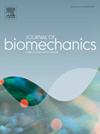BIASMECHANICS: Does an unconscious bias still persist in biomechanics, positioning males as the default in human research? A meta-analysis on the Journal of Biomechanics 2024 publications
IF 2.4
3区 医学
Q3 BIOPHYSICS
引用次数: 0
Abstract
Articles published in the Journal of Biomechanics still reflect bias, with males positioned as the default in human research. This meta-analysis on the 2024 articles reveals a large disparity in female representation. One in four studies showed an imbalance (<30 % female representation) favouring male participants, while only 8 % favoured females. Male-only studies outnumbered female-only studies by over fivefold. Of particular concern is that male-only studies often lack justification for their single-gender focus, whereas female-only studies typically provide clear reasoning. This inconsistency not only lacks accountability but also reinforces the notion that male data is the standard in biomechanics research. I named this issue biasmechanics to encourage efforts to address them. While there are valid scientific reasons for focusing on specific gender/sex groups, this should not be the default. Authors must consider sex- and gender-based differences, and reviewers and editors should adopt stricter standards for accepting articles with unjustified imbalances. The Journal of Biomechanics could establish standardized guidelines promoting equitable representation in research. Exclusions of any sex or gender must include clear scientific justification in the introduction and methodology sections. The discussion and limitations sections should assess the implications of such exclusions, including their effects on validity, generalizability, and bias. If appropriate, titles and abstracts should clearly indicate single-sex or gender-specific studies to ensure transparency about the research’s scope and applicability. By collectively affirming as a scientific community that, except for legitimate scientific justification, we oppose the exclusion of female participants, we can shift the default approach in our research studies.
求助全文
约1分钟内获得全文
求助全文
来源期刊

Journal of biomechanics
生物-工程:生物医学
CiteScore
5.10
自引率
4.20%
发文量
345
审稿时长
1 months
期刊介绍:
The Journal of Biomechanics publishes reports of original and substantial findings using the principles of mechanics to explore biological problems. Analytical, as well as experimental papers may be submitted, and the journal accepts original articles, surveys and perspective articles (usually by Editorial invitation only), book reviews and letters to the Editor. The criteria for acceptance of manuscripts include excellence, novelty, significance, clarity, conciseness and interest to the readership.
Papers published in the journal may cover a wide range of topics in biomechanics, including, but not limited to:
-Fundamental Topics - Biomechanics of the musculoskeletal, cardiovascular, and respiratory systems, mechanics of hard and soft tissues, biofluid mechanics, mechanics of prostheses and implant-tissue interfaces, mechanics of cells.
-Cardiovascular and Respiratory Biomechanics - Mechanics of blood-flow, air-flow, mechanics of the soft tissues, flow-tissue or flow-prosthesis interactions.
-Cell Biomechanics - Biomechanic analyses of cells, membranes and sub-cellular structures; the relationship of the mechanical environment to cell and tissue response.
-Dental Biomechanics - Design and analysis of dental tissues and prostheses, mechanics of chewing.
-Functional Tissue Engineering - The role of biomechanical factors in engineered tissue replacements and regenerative medicine.
-Injury Biomechanics - Mechanics of impact and trauma, dynamics of man-machine interaction.
-Molecular Biomechanics - Mechanical analyses of biomolecules.
-Orthopedic Biomechanics - Mechanics of fracture and fracture fixation, mechanics of implants and implant fixation, mechanics of bones and joints, wear of natural and artificial joints.
-Rehabilitation Biomechanics - Analyses of gait, mechanics of prosthetics and orthotics.
-Sports Biomechanics - Mechanical analyses of sports performance.
 求助内容:
求助内容: 应助结果提醒方式:
应助结果提醒方式:


